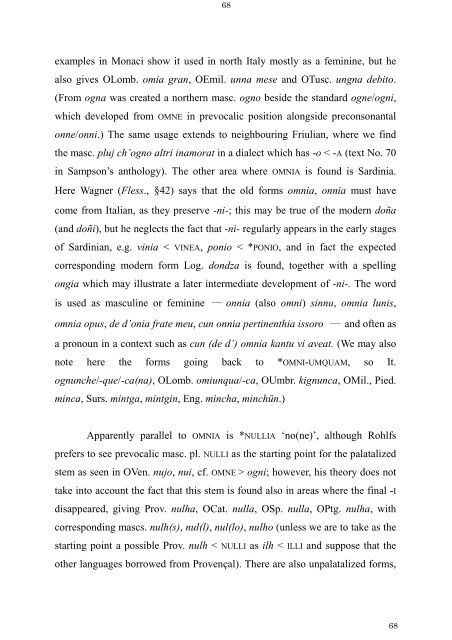The Latin Neuter Plurals in Romance - Page ON
The Latin Neuter Plurals in Romance - Page ON
The Latin Neuter Plurals in Romance - Page ON
Create successful ePaper yourself
Turn your PDF publications into a flip-book with our unique Google optimized e-Paper software.
68<br />
examples <strong>in</strong> Monaci show it used <strong>in</strong> north Italy mostly as a fem<strong>in</strong><strong>in</strong>e, but he<br />
also gives OLomb. omia gran, OEmil. unna mese and OTusc. ungna debito.<br />
(From ogna was created a northern masc. ogno beside the standard ogne/ogni,<br />
which developed from OMNE <strong>in</strong> prevocalic position alongside preconsonantal<br />
onne/onni.) <strong>The</strong> same usage extends to neighbour<strong>in</strong>g Friulian, where we f<strong>in</strong>d<br />
the masc. pluj ch’ogno altri <strong>in</strong>amorat <strong>in</strong> a dialect which has -o < -A (text No. 70<br />
<strong>in</strong> Sampson’s anthology). <strong>The</strong> other area where OMNIA is found is Sard<strong>in</strong>ia.<br />
Here Wagner (Fless., §42) says that the old forms omnia, onnia must have<br />
come from Italian, as they preserve -ni-; this may be true of the modern doña<br />
(and doñi), but he neglects the fact that -ni- regularly appears <strong>in</strong> the early stages<br />
of Sard<strong>in</strong>ian, e.g. v<strong>in</strong>ia < VINEA, ponio < *P<strong>ON</strong>IO, and <strong>in</strong> fact the expected<br />
correspond<strong>in</strong>g modern form Log. dondza is found, together with a spell<strong>in</strong>g<br />
ongia which may illustrate a later <strong>in</strong>termediate development of -ni-. <strong>The</strong> word<br />
is used as mascul<strong>in</strong>e or fem<strong>in</strong><strong>in</strong>e — onnia (also omni) s<strong>in</strong>nu, omnia lunis,<br />
omnia opus, de d’onia frate meu, cun onnia pert<strong>in</strong>enthia issoro — and often as<br />
a pronoun <strong>in</strong> a context such as cun (de d’) omnia kantu vi aveat. (We may also<br />
note here the forms go<strong>in</strong>g back to *OMNI-UMQUAM, so It.<br />
ognunche/-que/-ca(na), OLomb. omiunqua/-ca, OUmbr. kignunca, OMil., Pied.<br />
m<strong>in</strong>ca, Surs. m<strong>in</strong>tga, m<strong>in</strong>tg<strong>in</strong>, Eng. m<strong>in</strong>cha, m<strong>in</strong>chün.)<br />
Apparently parallel to OMNIA is *NULLIA ‘no(ne)’, although Rohlfs<br />
prefers to see prevocalic masc. pl. NULLI as the start<strong>in</strong>g po<strong>in</strong>t for the palatalized<br />
stem as seen <strong>in</strong> OVen. nujo, nui, cf. OMNE > ogni; however, his theory does not<br />
take <strong>in</strong>to account the fact that this stem is found also <strong>in</strong> areas where the f<strong>in</strong>al -I<br />
disappeared, giv<strong>in</strong>g Prov. nulha, OCat. nulla, OSp. nulla, OPtg. nulha, with<br />
correspond<strong>in</strong>g mascs. nulh(s), nul(l), nul(lo), nulho (unless we are to take as the<br />
start<strong>in</strong>g po<strong>in</strong>t a possible Prov. nulh < NULLI as ilh < ILLI and suppose that the<br />
other languages borrowed from Provençal). <strong>The</strong>re are also unpalatalized forms,<br />
68









